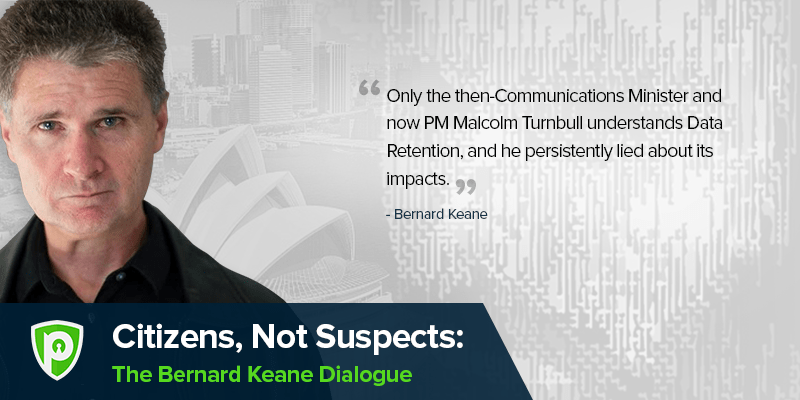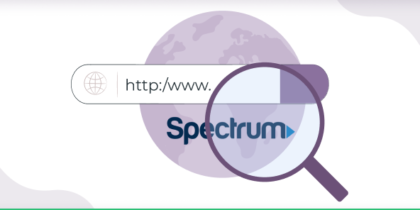China has already been making the rounds with her over the top surveillance habits. But it doesn’t come as much of a surprise. You sort of expect something like that from a nation with a “Great Firewall”. What made the headlines this year was Australia. The Kangaroo nation has an up and coming economy, is a great holiday destination, has diversified population and *drum roll*, a Mandatory Metadata Retention Law.
A lot has been said about Australian Data Retention Law. PureVPN’s Australian traffic spiked by approximately 700% this year alone! As promised, our efforts to raise awareness continue. Rather than pushing readers with what we think, throughout the year, this time around, we decided it would be better to use the words of more influential members of society. In that pursuit, we turned to the man with an opinion, and a wit as sharp as a dagger – Bernard Keane.
Author of “The War on the Internet”, Keane attended the University of Sydney and followed it up with becoming a public servant and speechwriter. In the year 2008, he joined the world of journalism. Keane is currently associated with Crickey as a writer and the Politics Editor. He’s been vociferous, at times ferocious, with how the Australian government has gone about metadata retention. Grab a seat, calm your nerves and take a few minutes to read what the great Bernard Keane has to say.
The Interview
Q: Do you think people are fully aware of what Data Retention actually is and the gravity of the situation? Do they comprehend the fact that they will now be monitored 24/7? If not, why?
Response: There’s a very poor understanding not so much of the reality of data retention by Australians as its impact – there’s neither an understanding of its chilling effect on press freedom or whistleblowers, for example, nor of the likelihood that the retained data will be the subject of a data breach.
This lack of understanding is partly because of poor, inept or often biased reporting by the mainstream media in Australia, and also because Australians in general don’t have a strong grasp of free speech and free press issues.
Surely we can’t fight ebola properly without metadata storage and unlimited control orders?
— Bernard Keane (@BernardKeane) October 9, 2014
Q: In an age where Facebook, Instagram and Twitter are enough to paint a rather accurate image of an individual’s life, do you think Metadata Retention will be taken seriously for what it is?
Response: This is another area of confusion for Australians. Sharing of personal information on social media has no parallel to data retention – Facebook et al. can’t arrest you, or jail you and use of their “service” is voluntary. But many see the two as forming part of the same spectrum.
Q: What to do you have to say to someone who says, “I have nothing to hide and thus I’m the least bit bothered with Data Retention…”?
Response: My standard response to this follows:
Wear clothes in warm weather and have blinds in your windows? What are you hiding?
Are you happy for everyone to know where you are all the time, who your friends are, with whom you’re having a relationship, everyone you call, whether you have a medical or financial problem? It is not up to privacy advocates to “prove” the right to or importance of privacy. All governments acknowledge it is a fundamental right. If you support breaching that right, it is up to you to make the case, not demand privacy advocates defend it.
And law enforcement and intelligence agencies don’t merely target people “with something to hide”. People as diverse as whistleblowers, journalists, politicians, non-governmental groups and activists are subject to surveillance by such agencies, despite not having “done anything” other than reveal wrongdoing by governments and companies and protest against it.
We know that journalists’ metadata is used now by the police so their sources can be identified. Data retention will make that much easier.
— Bernard Keane (@BernardKeane) February 5, 2015
Data retention thus, indirectly threatens core processes of democracy like whistle blowing, political organization and scrutiny of governments. And you may be comfortable with the current government having access to your data — but what about all future governments?
Q: Getting a warrant was made difficult for a reason. One should not invade an individual’s privacy without substantial reason. Does Data Retention, and no need for a warrant, give too much power to the state?
Response: Yes. All access to the “retained data” should be given via a judicial warrant process. There is no evidence to back up the claims of security agencies that this imposes an intolerable burden on them – many European countries have such requirements with no apparent harm to their policing efforts.
“Metadata? Luxury! When I were a lad you ‘ad to go to the police station an’ make all your calls to sources in froont of bloody detective!”
— Bernard Keane (@BernardKeane) March 18, 2015
Q: In an interview with Sky News (source) , Attorney-General George Brandis seemed rather confused as to what information the government wants stored. Do you think that the government completely understands the implications of Data Retention?
Response: Only the then-Communications Minister and now Prime Minister, Malcolm Turnbull understands it, and he has persistently lied about its impacts.
Q: What are the government’s intended goals with regards to Data Retention? Keeping in mind that such laws have failed to achieve much success in countries like Netherlands (source) and Germany (source) , do you think metadata retention will result in any significant change? Will the government achieve what it has set out to do?
Response: The real question is, what are the goals of security agencies that have driven the government to implement it. The international experience of the “Five Eyes” intelligence network of the US, the UK, Canada, Australia and New Zealand is that they want “all of it” — every single piece of information they can vacuum up from any source, whether it is useful or not.
And while the intelligence agencies that compose the Five Eyes network insist they work on national security and preventing crime and terrorism, in fact much of their activity is aimed not at protecting citizens, but at commercial espionage, (source) in which foreign governments and corporations are subjected to surveillance and the information gets passed on to Five Eyes governments and in turn to corporations in order to exploit. From this point of view, there is no reason for any limitation on data collection.
Abbott is lying about metadata. Agencies & AGD have been asked repeatedly in the last week for ANY evidence it works. They can’t produce any
— Bernard Keane (@BernardKeane) February 4, 2015
The Five Eyes’ mindset is one rooted in the analog era, when telecommunications were controlled by governments and security and law enforcement agencies had unfettered access to, and complete control of communications infrastructure. It was also much easier to control the media, which consisted of a few radio, TV and newspaper outlets controlled by a handful of large companies.
Data retention is part of an attempt to import this model to the internet, so that they have the same access and control of the online space that they had of the analog telephone network.
Q: Given the overall public outcry, will the Turnbull regime rollback data retention plans, keeping in mind he himself proposed using VPNs to circumvent metadata collection? In addition to Turnbull himself, numerous organizations and countless security experts have pointed to VPNs as a solution. What’s your take on using a VPN for maintaining personal privacy?
Response: I strongly urge everyone – I speak to about data retention – to get a VPN and use it as much as possible, and to use IP-based telephony apps rather than phone services. At Crikey, we have published guides about how to select VPNs. However, I caveat this by saying that you can only make yourself safer from surveillance, not safe per se.
I don’t see any likelihood of any changes to data retention laws until there is a major theft of “retained” data from a communications provider that creates outrage in the Australian electorate.
Q: Do you think the widespread use of VPNs will undermine the government’s ability to accurately conduct metadata retention?
Response: In relation to internet usage, I think yes, which is why I strongly recommend VPNs. Plainly, it has little effect on retention of telephony data. But VPNs are an important means of making the cost of mass surveillance significantly greater for security agencies.
Q: Harry Tucker (News AU) reports, “This scheme is allegedly being implemented to protect the country against organized crime and terrorism”. Do you think this has nothing to do with The Dallas Buyers Club Case, The Trans-Pacific Partnership and major broadcasting restrictions put in place to benefit media companies?
Response: I think the copyright cartels are delighted in the wake of promulgation of data retention law and would like to go further and get the power to ban VPNs in Australia. However, this has been driven by security agencies, not the copyright cartels – for at least 7 years they have been pushing for data retention, regardless of the copyright situation.
The argument that data retention protects anyone against organized crime or terrorism is demonstrably false: evidence from around the world shows that data retention, and mass surveillance schemes generally, do nothing to protect the public against terrorism and may even be harmful.
Q: Richard Chirgwin (The Register) had this to say, “Australian telecommunications service providers are required to start retaining customer metadata in an orderly fashion determined by law, but fewer than ten are ready to do so and some have asked the government if they can store the data without encryption” How would storing data without encryption affect the general public? Is this an indication that the government is over its head?
Response: This reflects the extent to which both the bureaucrats, driving data retention, and the politicians, they are advising, have no grasp of the security risks linked to data retention or the logistical requirements of storing data securely. There will be a major breach of “retained” data of Australians. The question is merely when it happens, and whether opponents of data retention can exploit it to pushback against it.
Q: Australia has become one of those nations that are actively restricting internet freedom; websites are being blocked and browsing habits are being monitored every day. Is Australia truly progressing or is it hindering its own development?
Response: While there is a strong anti-internet mentality within Australian bureaucracy and amongst major party politicians, the real problem hindering Australia’s development – in this area – is the destruction of the previous government’s broadband network scheme and its replacement with outdated copper-wire technology by the current government.
Q: What is the one piece of advice you give to everyone concerned with online security?
Response: Get a VPN, encrypt your hard drive and phone, use IP-based communication platforms over telephone and vote for politicians who both understand and take internet seriously.
About Bernard Keane: Bernard Keane has been Crikey’s correspondent in Canberra since 2008, writing on politics, media and economics. He is the author of War On The Internet and the novel Surveillance, and co-author of A Short History of Stupid, with Helen Razer.



